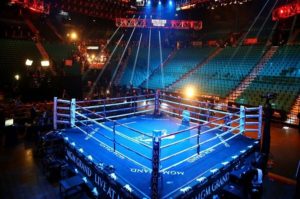Ringside Report Looks Back at Boxer Fred Perry
 By Donald “Braveheart” Stewart
By Donald “Braveheart” Stewart
I do love a mystery and when it comes to boxers of yesteryear, I have certainly stumbled across one here. In my weekly search to find fighters of interest and those who have been lost to us over the decades I often come across those with little or no internet footfall and this time round, Fred Perry, 0-3-1, 0 KOs, is one that has done more than intrigued. This is a Welsh Olympian, born in the capital Cardiff of which there is little or no internet evidence whatsoever.
In the 1928 Olympics, held in Amsterdam, he represented Great Britain as a featherweight. He turned professional, fought three times, lost each one of the contests and then disappeared before passing in 1981, aged 77 in Cardiff. And that’s your lot.
He must have been good. To be an Olympian was special after all, but he was Great Britain’s sole boxing representative at his weight – this was the first time that limit per weight division had been placed on nations competing. It was notable that Japan fought as an Asian country at the Olympics for the very first time. The most medals were gathered by Italy and Argentina with four apiece.
Having received a first round bye, he entered the fray in the second round and beat the Hungarian Miklós Gelbai by decision. It meant he was off to the quarter finals. Unfortunately, in the quarters he met the Dutch Bep van Klaveren and was beaten. No disgrace as the Dutchman went on to claim the gold medal.
And then the story goes cold for Perry.
Given that he possesses one of the most famous names in British sport, though it more famously belongs to a tennis star, typing in Fred Perry boxers brings you pages on the internet of men’s undergarments. The tennis star Perry has spawned the Fred Perry clothing company, so we are likely to have to wade through many websites devoted to keeping your testicles fresh, whereas the boxer Perry was likely to be looking for much stronger and robust protection.
Welsh boxing guru, Gareth Jones, who must know far more about Welsh boxing than anyone has written series of books chronicling the boxing scene in Wales: I await the Cardiff chapters being sent to me to check out if there is anything in there to help.
It will arrive too late for this, but I shall update once I have the thing!
But my initial search led me to a time, the 1930s when boxing served under the shadow of looming conflict around all of us. That Perry survived the war and got not just to the other side but lived long into his seventies says a great deal about his resilience. But of the era in which he boxed professionally, having come from the amateur code of the Jazz age of the 1920’s, it was certainly worthy of me stopping for a moment and reflecting on how things were globally in the square ring as the world got ready for a fight outside of every sporting event imaginable.
As for Perry, he became a professional on the 28th of September 1937, in Dudley, near Birmingham, when he lost to Ronnie Smith who was already fighting his 22nd professional fight, having won 17 of them. Then came George Willis, with whom he drew over 6 rounds in Stafford on the 15th of November the same year. With a record of 0-1-1, he then saw in 1938 with two contests, both of which were defeats – against Albert Southall in Dudley and then Alf Edwards in Birmingham itself.
But Wales, the place from which we have seen the likes of Joe Cordina, Steve Robinson, Barry Jones, Nathan Cleverley and the one man who retired undefeated – the only British boxer to do so – in the professional game, Joe Calzaghe, was producing some impressive fighters in the beginning of the 20th century. There was Jimmy “the Ghost with a Hammer in his Hand” Wilde who lost only five times, knocked out 99 opponents and managed a 150-fight career. Then at heavyweight there was Jack Peterson who became the British champion whilst Tommy “the Tonnypandy Terror” Farr won the Empire title (now the Commonwealth title) and lost a 15 round decision in 1937 to none other than Joe Louis.
It also became the home of British boxing when in 1929, the British Boxing Board of Control and the Welsh Board amalgamated, and you can find the headquarters of the governing body in the Welsh capital city of Cardiff today.
But in the era of the Great Depression, when boxing, along with the rest of society was dealing with such intense economic hardship, things were tight and hard. But it was the era of other great fighters like Kid Chocolate – it was not just the Welsh who could pick imaginative and colorful names – Max Schmeling, Jack Kid Berg, Battling Battalinio, Gorilla Jones, Battling Shaw, Max Baer, Benny Lynch, Sixto Escobar and Henry Armstrong.
As for how Perry faired in amongst those greets – some more digging is required and so, hi ho, off to work I go…
Click Here to Order Boxing Interviews Of A Lifetime By “Bad” Brad Berkwitt

